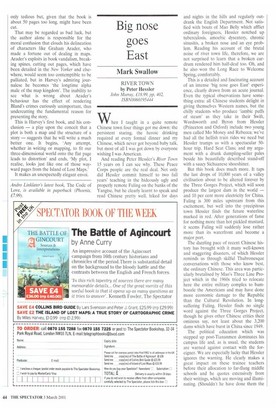Stealing and dealing
Andro Linidater
THE ISLAND OF LOST MAPS: A TRUE STORY OF CARTOGRAPHIC CRIME by Miles Harvey Weidenfeld, £12.99, pp. 405, ISBN 029784234X The fascination of a map is that it acts as a mirror to the mind. Stare long enough at the jagged black squiggle that is a coastline or the pale blue tendril that represents
a river, and what appears is no longer the coast or the river, but the dreams, memories and desires that such places inspire in you. Robert Louis Stevenson had only to sketch an imaginary island for his romantic disposition to see in it characters who
began to appear there visibly among imaginary woods; and their brown faces and bright weapons peeped out upon me from unexpected quarters as they passed to and fro, fighting and hunting treasure.
By his own account, from that source sprang Treasure Island. Similarly, what revealed the explorer in Alexander von Humboldt was a study of maps, which
aroused a secret fascination that was at times almost irresistible, and seemed to bring me into close relationship with distant places and things.
And then there are those who gaze at the contours, curlicues and cross-hatching, and see only money. These people trade in ancient maps, they break the spines of old books to scissor out a valuable engraving of 18th-century colonial America or 19thcentury Africa, and they worm their way into the archives section of a library and razor out from a centuries-old atlas the sheet that they or their customers want. In the last two decades, the market has grown so rapidly that a 16th-century county map of Dorset that sold in the 1970s for £140 now has a price-tag close to £4,000. The record-holder is a 1482 vellum map based on Ptolemy's Geographia which reached over £1,280,000. This world of romance, skulduggery and high stakes provides Miles Harvey, an American journalist, with the subject of his book.
At the heart of it is a thief called Gilbert Bland who used a cut-throat razor to excise the items he wanted. For years he got away with it thanks to the high-minded innocence of librarians, reluctant both to believe that anyone could act like that and to admit their folly to those who had entrusted them with rare books, coupled to wilful ignorance on the part of the mapdealing business which evidently preferred not to enquire too closely into the provenance of desirable items. When he was arrested, his stock consisted of about 250 maps, some over 400 years old. That collection is what Harvey refers to as 'the island of lost maps'.
As a concept for a book, this is promising, layers of ethical murkiness collecting round a corrupt, Graham Greene-like protagonist. Certainly the author aims high, allowing himself Kafkaesque musings about the reality of appearances and flights of fancy comparing his literary explorations to those conducted by Sir Walter Raleigh, H. M. Stanley, Humboldt and others. Unfortunately for such a plan, Bland was by nature as by name. 'He looked bland, he sounded bland, he acted bland,' exclaimed one exasperated dealer. 'There was no personality: nothing there.' To make matters worse, Harvey never meets the nonentity, and the padding that fills the gap is not only tedious but, given that the book is about 50 pages too long, might have been Cut.
That may be regarded as bad luck, but the author alone is responsible for the moral confusion that clouds his delineation of characters like Graham Arader, who made a fortune out of dealing in maps. Arader's exploits in book vandalism, breaking spines, cutting out pages, which have been detailed in the New Yorker and elsewhere, would seem too contemptible to be palliated, but in Harvey's admiring journalese he becomes 'the longtime alpha male of the map kingdom'. The inability to see what is wrong about Arader's behaviour has the effect of rendering Bland's crimes curiously unimportant, thus undercutting the fundamental reason for presenting the story.
This is Harvey's first book, and his conclusion — a play upon the conceit that a plot is both a map and the structure of a story — suggests that he will write a much better one. It begins, 'Any attempt, whether in writing or mapping, to fit our three-dimensional world onto the flat page leads to distortion' and ends, 'My plot, I realise, looks just like one of those wayward pages from the Island of Lost Maps.'
It makes an unexpectedly elegant envoi.
Andro Linklater's latest book The Code of Love, is available in paperback (Phoenix, £7.99).













































































 Previous page
Previous page